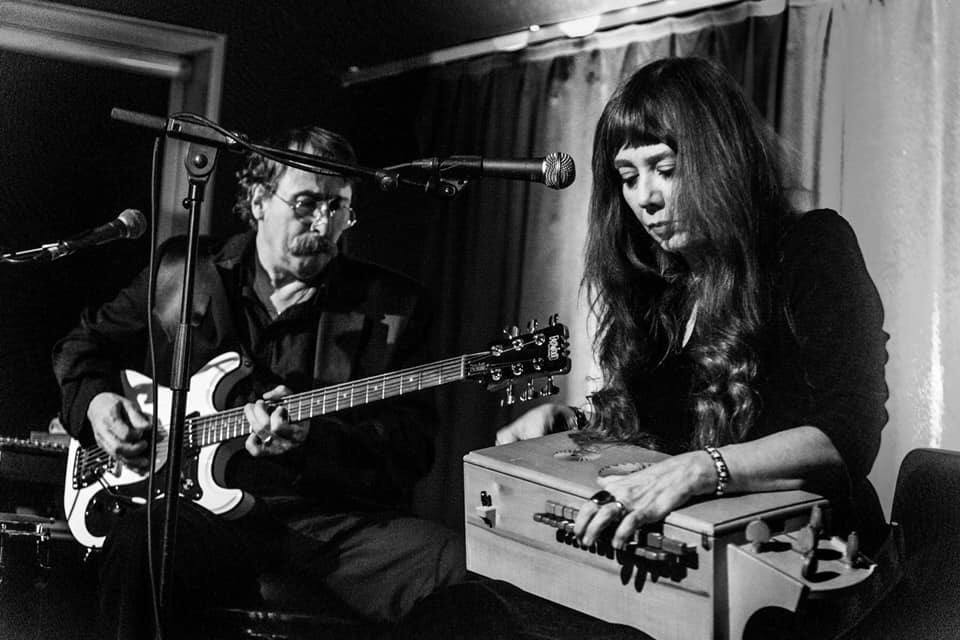The following is a work-in-progress from an hour-long conversation I had with Danielle de Picciotto and Alexander Hacke at Sam Bond’s Garage in Eugene, Oregon, on 29 August 2015.
Alex and Danielle are performing soon but they’ve arrived early to speak with me. We’re sitting at a table in the backyard and I awkwardly explain that I want to write an article that will speak to an audience of people that could use a bit of validation to tap into their own creativity and go with their artistic instincts. It’s something that Alex and Danielle are very qualified to speak about, since they’ve been deliberately living as nomadic artists for a half a decade. My first question is to ask them how long they’ve been on the road.
Danielle Well, we gave up our house five years ago.
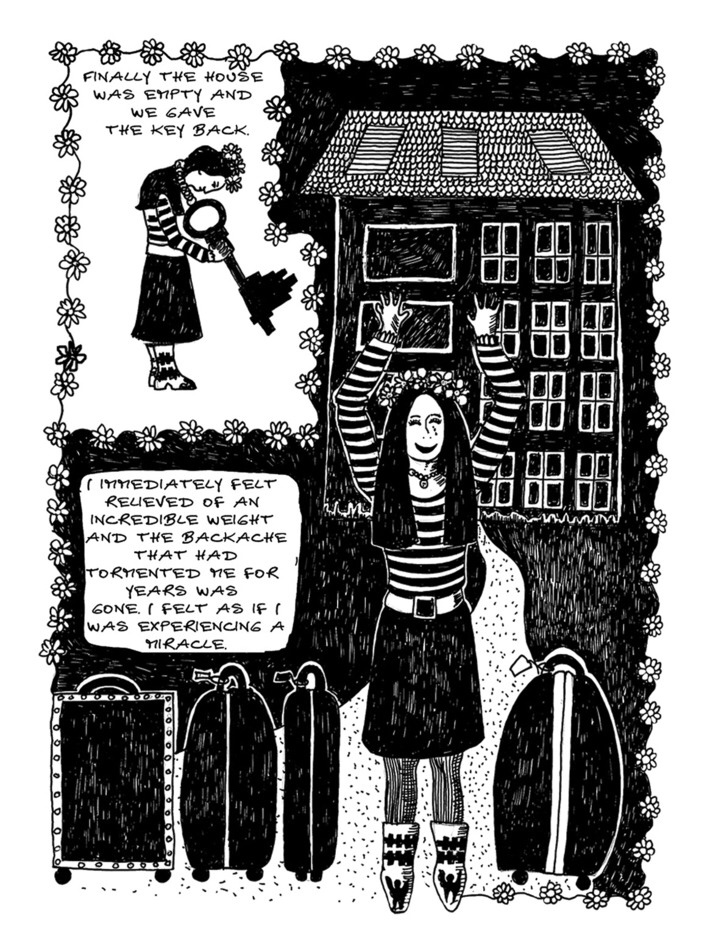 We’ve been touring for almost fifteen years doing projects we’ve always initiated ourselves. But, we’ve been without a home for almost five years.
We’ve been touring for almost fifteen years doing projects we’ve always initiated ourselves. But, we’ve been without a home for almost five years.
Alex We’ve been nomads for five years, y’know, not natives.
I’ve been there. I had a counterculture upbringing and was also a nomad for almost five years.
Danielle It’s a long time—five years.
Yeah, it is. Especially for a kid. And this book you’ve written focuses on the first eighteen months?
Danielle Yeah . . .
Are you starting to feel the burn-out yet? Constantly moving from place to place without a home base.
Danielle Well, there’s been a lot of ups and downs, in a way. The first two years we were very enthusiastic and very excited about it. Then we had two years of being very depressed about it and fighting with that sudden realization what it means not to have a home. I think now, at the moment, we’ve become capable of dealing with all those issues and just kind of being neutral to the whole theme but I [she glances at Alex] for one would like to settle down again, because I have the feeling that for my work it’s important to be able to be in one space for a longer amount of time—to be able to concentrate on the work instead of traveling. I really enjoy traveling but I have the feeling, if I don’t settle down again at some point, my work is gonna become superficial.
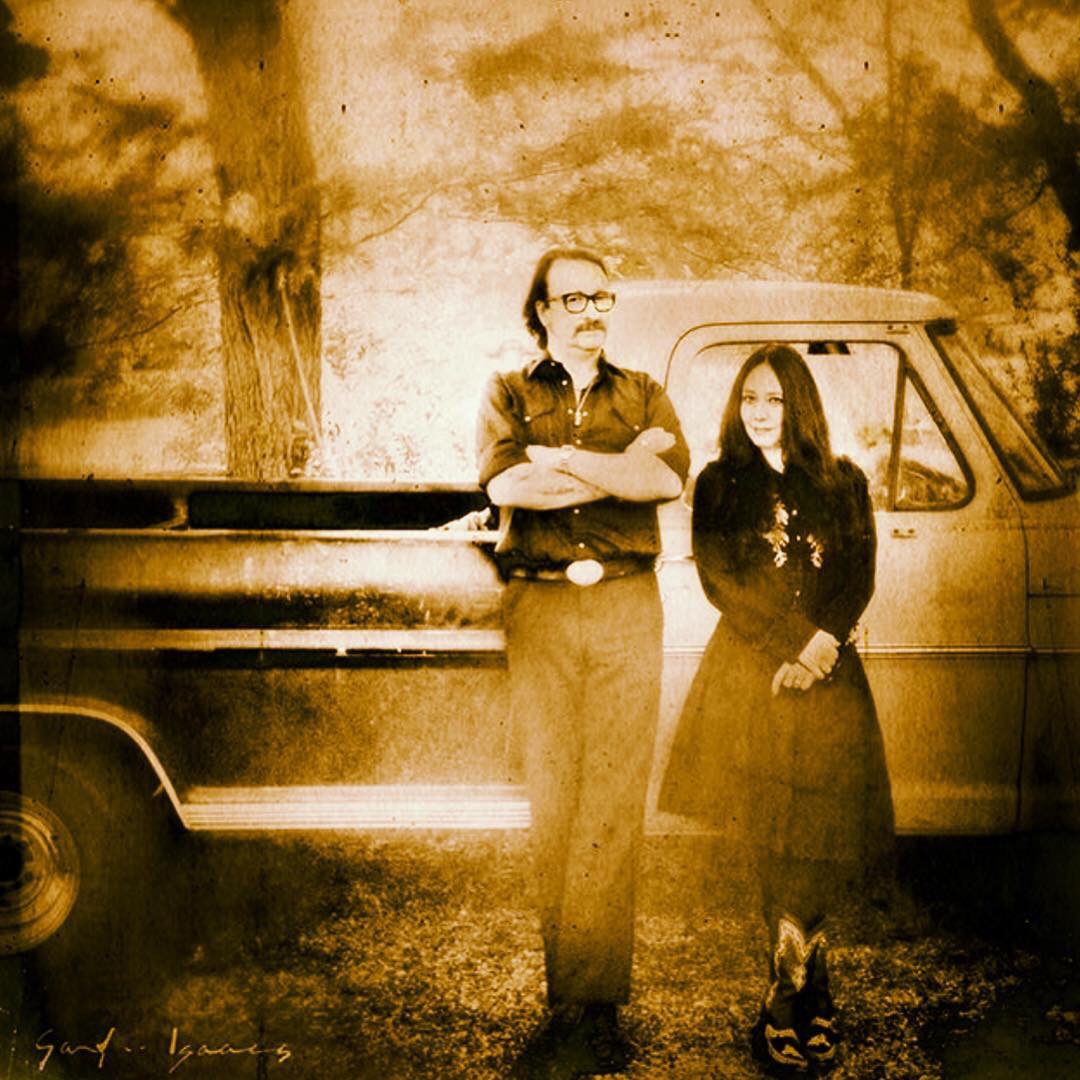
I imagine that settling down would also give you a gestation period to create a new works of artistic expression.
Danielle Exactly! Right.
Alex For me, in the beginning, I was a skeptic. I didn’t know whether I could handle the process or if I could handle living without a homestead, because I’ve been traveling all my life, I’ve been touring all my life since I was fifteen or something, but I always had a place to come back to and since 2010 I didn’t have that anymore. And in the beginning I was worried that I wouldn’t be able to handle it. And then there came this euphoria, like two years, y’know, I was in a state of euphoric epiphany like [shouts out “woo-hoo!”] I can do anything! I don’t need anything, I’m free. Y’know, that was really great for awhile. And, then . . . and then it just takes a toll on you physically if you don’t give your system a chance to switch off to recuperate if you don’t have that certain spot where you just go back to and recharge your batteries. You’re always in a state of having to be alert and polite and operating within the parameters you are given when you are traveling and you are relying on people to be hospitable and when you rely on having commissions that bring you to certain places.
It sounds like you’re also ready to settle down again.
Alex I’m about ready to, y’know. I would like to build my alters and my shrines and basically that interior decoratoring . . . I miss that a little bit.
Danielle We’re quite different, too, in the way that Alex is a rare thing, a real Berliner. He was born and raised in Berlin, so Berlin is kind of a scene like New York where a lot of people move to, especially when the wall was there, especially men (because of the army) so he had a home, a place where he was from. But he started touring early on.
What about you? Are you rooted to a specific place?
Danielle I never had a home because my father was in the army. I was born in Tacoma and three months later we moved so I don’t have any place that I can identify with from the start. The place I lived the longest was Berlin, which was kind of like my adopted home. So, for me, it’s kind of been a state that I’ve been in all my life— except when I was in Berlin—that I was traveling and I can adapt very fast. Alexander is used to traveling but he always had that home. So, it’s interesting to see how it affected us differently.
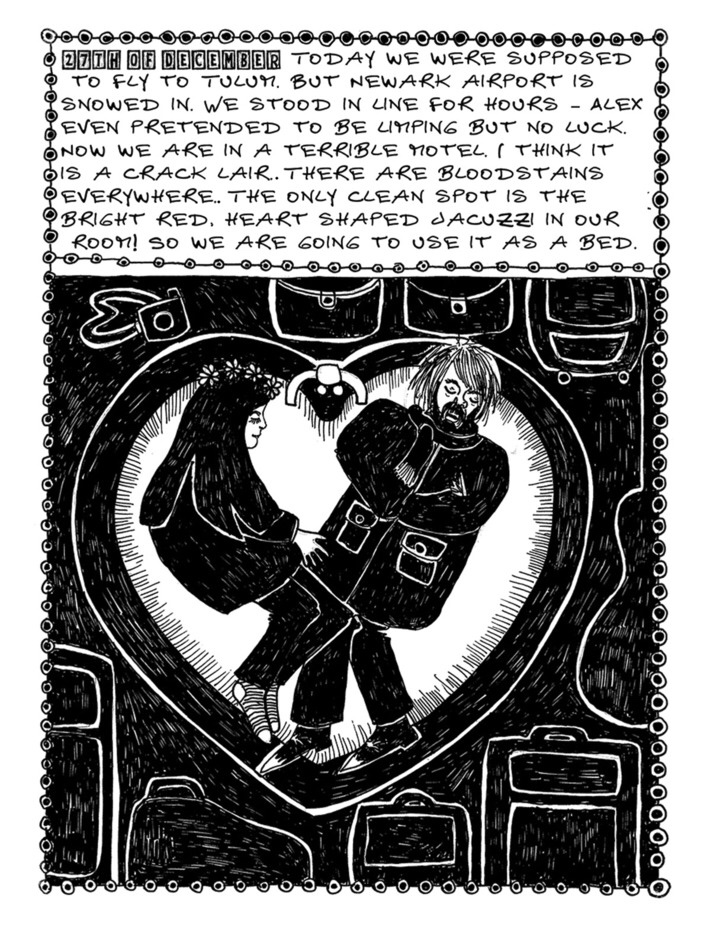
Alex, did you find that when you left Berlin at fifteen—each time you left and came back—that you came back to a changed city that wasn’t the home you remembered? Or, did you always feel you had come home?
Alex Well, the city I born in doesn’t exist anymore. I was born and raised in West Berlin and the city is not there. There’s a new city now which is the new capital of the new united Germany which is the city that came to be after 1990 which is a very different one from the city I spent my formative years.
Danielle It’s like living in a different country, actually—it’s incredible. It’s like living in a different country and you haven’t moved.
Alex We all had to . . . natives and everyone that moved there . . . we all had to adapt in the way that there is a completely new set of rules from that point on. At the end of the Cold War when the Wall came down and West Berlin didn’t have any hinterland, y’know, it didn’t have any suburbs. You could only go so far and you’d get to the Wall and that was the end of your plate. And, when the Wall fell, there was suddenly suburbs from little villages that were around with people that would come and frequent the city over the weekend and it was very different. And I didn’t adapt to it very well, personally, in 1990 when all that started. I kind of secluded myself even more.
Danielle [to me] Did you go to Berlin in the eighties?
No, my first trip to Europe was in 1991. Even though I traveled extensively that first year and worked in Switzerland for several years after, I never made it to Germany. I always had my usual haunts in Paris or Amsterdam and various cities and villages in Italy that kept me from going to new places. My perception of Berlin comes exclusively from German movies I’ve seen—specifically the films of Wim Wenders.
Alex Wim Wenders is a good example. That Berlin, that you see in Wings of Desire, that Berlin is definitely not there anymore.
Danielle That’s the Berlin I moved to—I saw the movie when it came out and the week after I moved to Berlin. I actually moved there from New York (in 1987). So, when I moved to Berlin it was kind of like, this is incredible, this is the kind of dream you have of an island where there’s only artists and musicians and everything is really really cheap. I got an appartment that cost $35 for 800 square meters and it was not dangerous and there was as much culture and art as there was in New York and I was just dumbstruck. I saw it a couple of years before the Wall came down and it was such an ideal situation for anybody that is interested in culture, it’s really hard adapting it to becoming basically a normal German city. I mean, it’s still a party city and a lot of things going on, but basically it’s adapted to modern times. And, once you’ve experienced something like that, it’s hard to get used to anything else because it was just so incredibly perfect.
My experience of being a nomad as a child and later as an adult is complicated. I cherish my unconventional and wild experiences but it’s created a longing . . . I suppose an eternal search for a place to place that feels like home. So, I’ve been searching for decades, trying out different cities and towns to see if they were a fit. I lived in Eugene in my teens and the first few years of my twenties. Then I moved to California. I tried on New York for a few years. Now I’m rooted in California again. But, in the past I always left places because something in my life wasn’t working and I figured the best way to shake things up was to change my environment by moving to a different town or city. Why did you both leave Berlin?
Danielle One of the reasons we left Berlin was that we really couldn’t deal with the gentrification anymore.
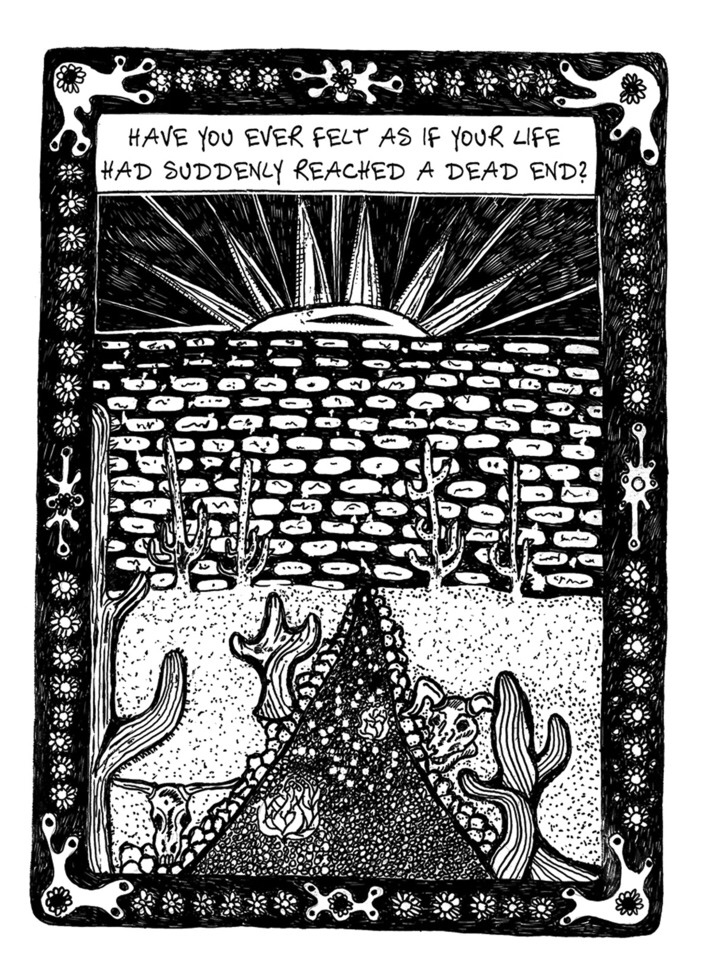
People like us are still basically underground artists and we don’t do things because of money, although we’ve been doing our art for thirty years now, and Berlin—which is a party city that wants to attract tourists—is concentrating more and more on mainstream stuff. We don’t do that so that’s one of the reasons we left.
Gentrification seems to be the direction most big cities are moving in.
Danielle Yes, we’ve noticed that almost all of the big metropolitan cities are like that—New York is crazy in that way and so is Los Angeles—and I think we’ve noticed that we feel more comfortable in smaller places because they’re still more individual. So we like Eugene a lot; we like Houston a lot; we like Joshua Tree a lot. We feel more comfortable in smaller places because it’s not so much about big corporate companies and we think that we might be able to identify more. And, in the beginning we didn’t think that way. We thought, okay, New York, LA, London, Paris, and then we went there and everywhere we went people were saying “this is terrible, we’re leaving!” And we were like, omigod, everybody’s leaving, and we saw there was this huge movement of everyone leaving because they hated it so much.
I don’t know if you’ve noticed that there’s this huge flow of people going from New York to LA right now. The people in LA are freaking because the New Yorkers are coming.
And many Californians are moving North to Oregon and Washington.
Danielle Exactly!
Alex Or to Colorado—to Denver.
Danielle Denver’s a nice place, too. So, we’ve tried out all sorts of different places. Not for very long, though, because we wanted to just get a whiff of different places to see where we wanted to stay a little longer, and we noticed we like the smaller places better, even though we’ve grown up in big cities. We’re city slickers.
So now that you’re hip to the dissatisfaction people have with gentrification I imagine other artists are telling you that they’re also having a similar experience of not wanting to do their art just for the money.
Danielle Yes, it’s all about money and that’s the problem. I mean, if you look at Berlin it’s all being gentrified in a way…
…in a way that is pushing artists out?
Danielle Exactly! It’s being renovated and the rents go up and only certain people can afford paying the rents and buying things and everybody that can’t and doesn’t even want to . . . I mean, I think some of those prices are obscene and I wouldn’t want to pay them. Even if I could, a one-bedroom apartment in New York for $4,000 [she shakes her head].
Alex And that’s a global thing—the eradication of the middle-class. Either you’re filthy rich and you live the life or you are underground and you’re young and you’re wild and you don’t care and you live in a squat somewhere and then you can find great spaces and people that will help you like a Detroit kind of feel. But, that works when you’re young, y’know.
Danielle I actually think it’s being erased. I think it’s gonna end up like Hong Kong in the end effect. Those big cities…they’re gonna try and erase everything.
I’ve noticed a certain homogeneity in gentrification that seems to value exclusivity. If that’s the case, as independent or avante garde artists, do you feel you’re welcomed into that millieu or are you treated merely as a curiousity?
Danielle No, we’re people that question things with our art. Gentrification doesn’t love that.
You’re shit disturbers.
Danielle [laughing] Exactly!
Alexander In the true meaning of the word, we’re not avante garde, y’know, because the avante garde are the ones that are sent first before the actual guard, before the actual army comes in, so we’re not forerunners of something that comes afterwards, basically we’re questioning, we’re more like dissidents, y’know—we’re running away from the army that is behind us.
Well, I see that, for sure. It seems to me that you are coming forward to spread this sort of message to get people to look at gentrification and consider other options. So, in that way I see you both as being avante guard.
Danielle I think we are in that way. I think we’ve always been five years ahead. I started getting really restless in ’95, ’cause I was like: Something is changing when industry moved into Berlin. Suddenly, things are changing and this is not gonna go in a good direction. And then, ten years later—that’s when you could really feel that they were becoming so powerful that they just didn’t care about the artists.
Which seems at odds with the global perception of Berlin
Danielle Right? Berlin lives off it’s reputation of being an artist’s city. And now they’re living off it and the artists aren’t earning anything from it, so it’s sort of become this mass media thing. So, I do think we’re avante garde in that way that we’re saying, “Y’know, we already said it five years ago and now everybody is starting to complain that it’s happening everywhere.” I don’t even know what you can do about it in big cities, because it’s the money and it’s the power of those corporate companies, it’s so big that I think the only thing one can do is for us to go to that smaller place where the eye of those corporate companies hasn’t focused yet and try and build a really strong force of people who are not gonna give in to . . . Starbucks, for instance.
***
Danielle de Picciotto is a musician with Crime and the City Solution with a recently released solo album called Tacoma. She is also the author of We Are Gypsies Now: A Graphic Diary.
Alexander Hacke is a musician best known as a member of the post-punk industrial band Einstürzende Neubauten.
They continue to tour the world and perform together . . . gypsies now and for the unforeseeable future . . .
